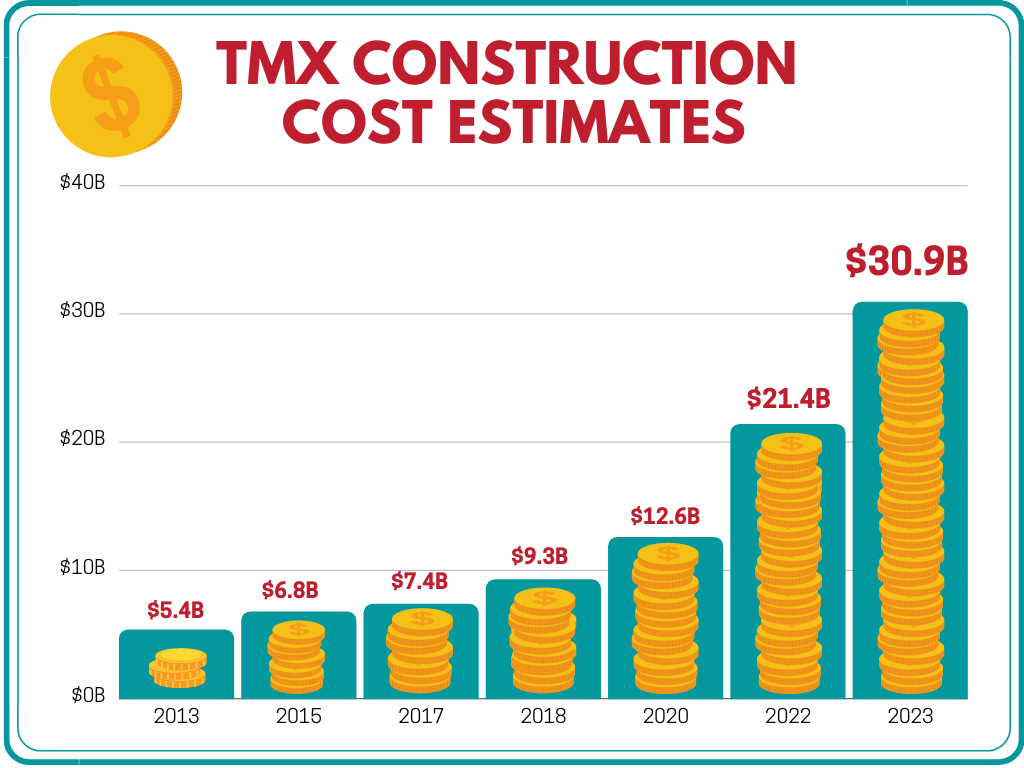
Last month, I published an op-ed marking the one-year anniversary of Trans Mountain’s last cost update (Feb. 18, 2022), when the price tag of the expansion ballooned to $21.4 billion. At the time, Finance Minister Chrystia Freeland promised that no more public money would be spent on the embattled pipeline and tanker project.
As I noted, our analysis of Trans Mountain’s public financial records revealed that:
- Trans Mountain was hiding its full financial picture through corporate shells and accounting wizardry;
- in spite of Minister Freeland’s promise, hundreds of millions of dollars have been added to the amount borrowed by Trans Mountain since February 2022;
- Minister Freeland was preparing to forgive up to $17 billion in debt owed to Canadians by Trans Mountain in order to facilitate a sale; and
- Canadian banks are propping up Trans Mountain by providing a $10 billion loan, while earning only 1.85% in interest, and by assuming the pipeline will operate for 100 years in order to make their analysis work on paper.
A little more than one year later, Trans Mountain has updated its cost estimate with another massive increase. The pipeline is now expected to cost $30.9 billion – which means it’s shaping up to be Canada’s most expensive mistake.
This is just the latest in a series of cost increases since the project was first proposed in 2013, when the estimated cost was just $5.4 billion. This single increase alone is almost double the initial cost of the project.
Here’s how this news changes our analysis:
To start with the obvious, the compromised commercial viability is even worse with the additional cost. This pipeline will continue to spill taxpayer dollars and lose Canadians a lot of money.
Finance Minister Freeland’s projected loan forgiveness is now approaching $25 billion. This is because only 20% of the cost increases can be passed along to the pipeline’s oil company customers. That means about $7.6 billion of the latest cost increase cannot be recovered through fees or tolls.
Instead, that amount will likely be added to the $17 billion that Minister Freeland is projected to forgive in order to facilitate a sale. This would result in yet another massive subsidy to the oil and gas companies that are reporting record profits.
It remains to be seen whether or how the big Canadian banks will step in to provide the additional $10 billion Trans Mountain needs to complete construction. Last time, the banks convinced the government to provide a loan guarantee, and then charged a very low interest rate of 1.85%. In February 2022, the prime interest rate was 2.45%, while in March 2023 it has jumped to 6.7%.
In other words, the banks willingly lost money for their shareholders to help the federal government solve a political problem and prop up this controversial fossil fuel project.
Canadian banks are trying to paint themselves as climate-concerned corporate citizens, with lofty-sounding promises about getting to net zero by 2050, and new climate banking alliances. But actions speak louder than words.
So keep a close eye on what your bank does in the coming months to see if those promises match with their actions, or if they are just greenwashing. Their actions on TMX will be a litmus test on the sincerity of their commitments to climate and reconciliation.